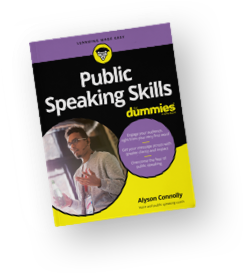There has been a lot of talk about vocal fry, in the voice world and beyond. Vocal fry is a low vibratory sound that is evident in people’s speech at the end of sentences. Last summer, journalist Naomi Wolf wrote about vocal fry in her column for the Guardian.
She cited a study in which subjects found those with vocal fry to be “less competent, less trustworthy, less educated and less hireable.” Women were furious at the results of this study. How dare society judge them on their voice?
Vocal fry is a cultural phenomenon, and I’m sure some people find it attractive. But as a vocal coach, everything I do to prepare speakers, if done well, will eliminate sounds like vocal fry. I teach my clients methods to combat the raspy sound that this creates. A good speaking voice is one with forward tone.
So what exactly causes vocal fry? It could be lack of breath support, tension in the larynx, or if the speaker speaks in a pitch that is too low for them. Those with vocal fry have slack vocal folds, causing them to ram together, creating the sound. The sound is similar to bacon frying in a pan. It’s often something we imitate. For instance, my boys have the same vocal pattern as my husband. Many times they’ve answered the phone only to tell the person on the other end, “Oh, I’m not Mark, I’m Patrick, his son.” So, if you are around people who speak with vocal fry, you will more than likely start speaking like that too. Just watch Kim Kardashian for a while and see what happens!
Vocal fry does affect your message. Those who speak with vocal fry tend to lack breath support at the end of their phrases, causing low, inaudible tones and popping sounds. It can be hard to make out what they’re saying, and eventually, people can tune out.
Both men and women have vocal fry. Pilots are especially prone to speaking in their low register. I think they do it to sound calming for those who are tense when they fly. Me, I get tense because I can’t hear what they are saying!
So how do you get rid of vocal fry? First, figure out if you have it. Whisper 1, 2, 3, 4, 5. Then count out loud. Do you hear any croaks when you speak? Does your voice drop off at the end of a sentence? Does your throat feel sore and hoarse after you give a speech? These are the symptoms, folks. The cure is to breathe, breathe, breathe! Take full deep breaths from the bottom of your lungs. Your belly and ribs should expand when you do this. And when you start speaking, support your breath from the beginning of the phrase to the very end. Raise the pitch of your voice slightly, too. Speak in the middle of your range. If you can do all of this, the audience will hear every word you say, and your message will be loud and clear!

